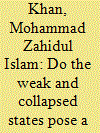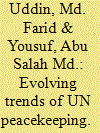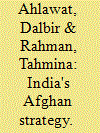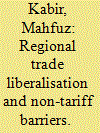|
|
|
Sort Order |
|
|
|
Items / Page
|
|
|
|
|
|
|
| Srl | Item |
| 1 |
ID:
134112


|
|
|
|
|
| Publication |
2014.
|
| Summary/Abstract |
Weak and collapsed states are portrayed as the primary global threat to security so frequently by the politicians, journalists and policy makers that it has almost become a reality. Yet, this seemingly universalised and undertheorised concept bears a different meaning to each actors and demands critical examination. From an international relations perspective, this paper examines the extent to which the weak and collapsed states challenge the realist account of maintaining world order. Conceptualising state weakness, this paper outlines the key realist assumptions to contrast those in weak states' context. Highlighting the realists underpinning that the structure of international system is resilient, the paper concludes that the concept of weak and collapsed states is a political construction and such states do not constitute a critical mass challenging the essential continuity of international order. International system is still dominated by powerful states and the opportunity for weak states to graduate upward under a resilient international system tends to outweigh the forces of weak and collapsed states, keeping the realist account of world order undaunted.
|
|
|
|
|
|
|
|
|
|
|
|
|
|
|
|
| 2 |
ID:
134109


|
|
|
|
|
| Publication |
2014.
|
| Summary/Abstract |
Peacekeeping has emerged as one of the core activities of the United Nations (UN). Due to ground realities, the doctrines, principles and structures of peacekeeping have evolved in accordance with necessity. In the traditional phase, during the Cold War era, peacekeeping was mostly limited to monitoring and observation affairs. In the post-Cold War era, there was an expansion of peace operations and "minimum use of force", where necessary, emerged as an acceptable norm of peacekeeping. In the consolidation phase, after 2000, peace operations emphasised on peace building affairs i.e., democratisation, institution building, security sector reform (SSR) and human rights protection. The phase of New Horizon, which started in 2009 indicating changing trends, focuses mainly on development, capacity building, planning and oversight. It can be argued that the future peace operations are going to be more robust and multidimensional, and would concentrate on responsibility to protect civilians, human rights and environmental issues, gender mainstreaming, democratisation and institution building to achieve sustainable peace in the conflicting areas. Being a leading troops contributing country, Bangladesh will face new challenges to adapt with the emerging trends of UN peace operations. The challenges include dealing with new doctrinal issues and capacity building of its peacekeepers in the field level. In this respect, the main objectives of this paper are to understand the changing trends of UN peacekeeping and to identify potential challenges for Bangladesh and its likely responses in the coming days to continue its contributions in the UN peace operations.
|
|
|
|
|
|
|
|
|
|
|
|
|
|
|
|
| 3 |
ID:
134111


|
|
|
|
|
| Publication |
2014.
|
| Summary/Abstract |
With the deadline for the US withdrawal from Afghanistan getting closer, regional and extra-regional states have indicated pivoting their Afghan strategy. India, being an emerging power, holds much potential to contribute to the stabilisation and reconstruction of war-torn Afghanistan by developing strategic partnership with other stakeholders. For this, India's status in the regional and international system, its economic and military might and its strategy to reach beyond its traditional zone of influence warrant a systemic analysis of its Afghan strategy. The article traces the antecedents of India's current strategic and foreign policy in classical Indian strategic text Arthashstra and analyses India's present level of involvement in Afghanistan in the light of that discussion. An attempt is made in this paper to show how India's Afghan strategy is informed and influenced by its perception of allies, enemies and indifferent big powers. The paper also suggests some policy changes by critically assessing the broader context in which India operates today.
|
|
|
|
|
|
|
|
|
|
|
|
|
|
|
|
| 4 |
ID:
134110


|
|
|
|
|
| Publication |
2014.
|
| Summary/Abstract |
Although trade liberalisation measures are in place for eight years, intraregional trade in South Asia has been meagre and is not encouraging at all as Bangladesh's export market in the region. India also granted duty free quota free access to almost all traded Bangladeshi products, which is also not showing significant increase in Bangladesh's export to reduce the country's mounting trade deficit with India. Therefore, overwhelming presence of non-tariff barriers has been perceived to be resulted in intra-regional trade significantly lower than expected. Given this context, the paper tries to identify the non-tariff barriers in South Asia in the context of Bangladesh's export expansion in this region. It takes a few product-specific cases in both export and import of Bangladesh to examine the barriers prevailing in neighbouring countries, viz. India, Nepal and Bhutan. The paper reveals that such barriers are related to bonded warehouse, gate pass, shipment and customs, infrastructure in land customs stations, visa, speed money, and excessive checking, which have been suggested to constrain expected gains from regional trade liberalisation measures. The paper argues that India's countervailing duty on garments import has not impacted negatively on Bangladesh's exports, but there is scope for further improvement if the duty is set equally for Indian and foreign manufacturers.
|
|
|
|
|
|
|
|
|
|
|
|
|
|
|
|
| 5 |
ID:
134113


|
|
|
|
|
| Publication |
2014.
|
| Summary/Abstract |
This paper presents the strategic importance and implications of a truth commission in the context of South Africa. The limitations of a transitional democracy throw into relief the transitional circumstances of justice. A politically negotiated truth commission is a preferred mechanism, if not the most, for dealing with politically motivated crimes and human rights abuses. A truth commission builds on the concepts of transitional justice and transitional amnesty, thereby meshes with the concept of the rule of law. A truth commission, in its simultaneous and complementary role to retributive justice, can contribute in settling profound political and social conflicts in a country's history. The paper argues that a truth commission satisfies political, legal and ethical requirements simultaneously in a transitional setting. A truth commission can, to a great extent, resolve tensions between truth, justice and reconciliation and play an emancipator role towards democracy, although it can never guarantee truth, justice or reconciliation as they come up with a mixed package that includes a clear objective of ending violence, attending to social inequalities and individual and social readiness. This paper lays out many positive and negative aspects of a truth commission and suggests why a truth commission has increasing appeal. A truth commission may help to render truth, justice and reconciliation and can serve the causes of democracy as well.
|
|
|
|
|
|
|
|
|
|
|
|
|
|
|
|
|
|
|
|
|